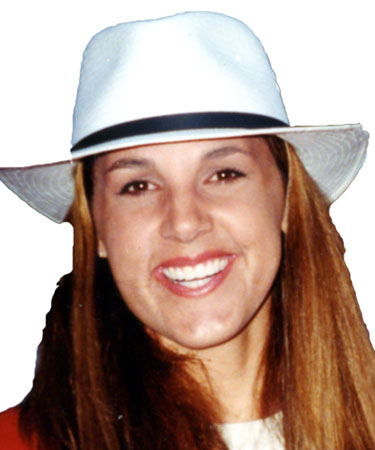 Athlete. The 1993 Omaha World-Herald and Lincoln Journal Star Female Athlete of the Year, Teri Steer-Cantwell was a bronze medalist in the shot put at the 1999 World Track and Field Championships and a collegiate record holder with a throw of 61 feet, 9 ½ inches. Steer earned 12 letters at Crete while starring in volleyball, basketball and track. She was a three-time gold medalist in the shot put and swept the Class B shot put and discus titles in her four high school seasons. She set the state record in the shot put with a throw of 50-10 ¾ inches and she twice placed in the top four in the Class B long jump. In basketball, she earned Class B all-state honors. She earned all-conference honors in volleyball. At Southern Methodist University, she set the Western Athletic Conference record in the discus and was a two-time national champion in the shot put. She competed in the 2000 Olympics in Sydney, Australia.
Athlete. The 1993 Omaha World-Herald and Lincoln Journal Star Female Athlete of the Year, Teri Steer-Cantwell was a bronze medalist in the shot put at the 1999 World Track and Field Championships and a collegiate record holder with a throw of 61 feet, 9 ½ inches. Steer earned 12 letters at Crete while starring in volleyball, basketball and track. She was a three-time gold medalist in the shot put and swept the Class B shot put and discus titles in her four high school seasons. She set the state record in the shot put with a throw of 50-10 ¾ inches and she twice placed in the top four in the Class B long jump. In basketball, she earned Class B all-state honors. She earned all-conference honors in volleyball. At Southern Methodist University, she set the Western Athletic Conference record in the discus and was a two-time national champion in the shot put. She competed in the 2000 Olympics in Sydney, Australia.
Long & Strong is pleased to bring you an interview with 1996 Outdoor NCAA Womens Shot Champ, Teri Steer of SMU. Teri, now a senior, recently suffered an ankle injury which leaves her 1997 status up in the air. Teri is a great interview, and has much to share. I hope you enjoy this as much as I did!
Long & Strong: Teri, can you give our visitors a little background information on yourself?
Teri Steer: I am from a small town in Nebraska called Crete (population 5000) and there’s not much to do except for sports. I have been involved with TAC summer track and field which I think now is usa track and field for youth, since I was five years old. I used to long jump and do sprints. When I was eight years old I picked up my first shotput and of course was terribly bad. Then we used a six pound shotput. The very next year I won my first ever national title for ten year olds and under called bantam girls. Then I loved track and field becuase every year we would travel across the States for meets. In high school I was a volleyball, basketball (as you can tell from my ankle injury), and track and field member. In track and field not only did I learn to throw the discus in 8th grade, I of course competed in my favorite, the shotput, long jumped, and ran the relay or hurdles or 100. I decided to sign early with S.M.U. for track and field only. I am recently engaged to the most wonderful man in the world Jason Tunks, who is an Olympic discus thrower from Canada. He and I love love to enjoy and watch every sport together. I am a history major and an anthropology minor. With that I am receiving my education certificate and someday want to teach and coach.
L&S: Can you give us your throwing progression (marks and titles) from high school up to the present?
TS: The titles I have earned I am not for sure but I think I won every tac summer track title in the shotput from when I was nine years old until 17, except for one year. In high school I was state champion in the discus and the shotput all four years. I tried out for my first USA junior team as a sophmore in high school. Interestingly enough, I sprained my ankle one week before the tryouts. My senior year I was third and became an alternate to the team.
High School Freshman: 148′, 45’7″
Sophmore: 146′, 46’9″,
Junior: 145′, 47’8″
Senior: 148′, 50’10”
College Freshman: 154 feet, 51’5, All American (7th outdoor NCAAs)
Sophomore: 160 feet, 53’6″, USA Junior Team
(*)Junior: 175′, 59′ indoors second and outdoors champ!!!, 6th at Oly Trials. (*)My first two years in college I was not training right for me and so when I started to train right I started to throw far.
L&S: Do you use the glide or spin in the shot? Why that style? What do you focus on technique-wise?
TS: I am a glider which makes most people wonder because I am not as strong as most or some shotputters who glide. I love the glide and would never switch I just have a feel for it and I love to do it. I always try and try to relax out of the back and concentrate on the middle of the circle out. I try to keep my shoulder and arm as well as the shotput back as long as possible but I am not a very patient person and so it seems I am always trying to stay back longer. From the middle out I try to turn the right foot and hit the crap out of the finish I extend so far out over the toe board sometimes I wonder how I stay in the ring myself.
L&S: What points do you concentrate on in the discus?
TSI hate to say it, but I am not a discus thrower yet. All fellow throwers and coaches thinks my body is meant for the discus but I have a terrible time with technique and feeling. I can honestly say I have no clue yet as to what I am supposed to be doing. I try and try but nothing ever stays true. I hope to be good someday and was working hard up to my injury but I really should not be giving advice.
L&S: Can you outline what you’re weight training plan is, off-season and in?
TS: Weight training is so important to throwers. I try to get a very big base during the fall. I will start out at very high reps and run six week cycles. I like to lift four days a week and split my routines. I will do 3 sets of 12 on squats, bench, behind the neck press, triceps, leg ext, leg curls, the highest repititions I will do on cleans is 4 sets 0f six. I will do snatches light and extra things that are secondary lifts like lat pulls, biceps, flys, and then twists and situps. Every once in awhile I will put in a shoulder workout with dumb bells. Then as the season progresses I will do do lower reps at higher reps go to 3×10 then 4×8, 5×6, 5×5, 5×3, 6×2, I like to do cleans at longer reps until right before a meet then I go down to two reps.
L&S: Other than the weights, what other types of training do you use?
TS: I am also a strong believer in fitness and I throw better when I feel fit and in shape. Early in the year I will do sprints and jumps. I will do even more during the season!! I love to feel explosive and so jumps are so important to me and I feel although everyone else thinks I am nuts that step aerobics does this for me. So I will try to get three to four aerobic classes in a week. If I am training hard maybe more classes in a week. I think it is important to know that there are different kinds of athletes and each person can obtain far distances by training differently. Early in the year I might mess around with the weight or hammer but during season I will not and I will throw six times a week both events during the season.
L&S: What are your post-collegiate plans?
TS: My post colliegate plans hopefully involve throwing. It is what I have done my entire life. All my goals are set to make some world teams and eventually become one of the top ten in the world. I do not know what else I can do, but i know i can not set limits, so every year I want to get better and better, every year I want to set a goal that is higher then I even think I can reach. For example, the beginning of the year last year I wanted to be national champion and I had only thrown 53 feet once in my life but I knew there was more there, I just needed a breakthrough and look where it has taken me. The only problem would be a sponsor and money to keep throwing. We will see what happens.
L&S: The SMU throws squad has had quite a bit of success over the last two years. What do attribute that success to?
TS: The success of S.M.U. is due to the team family spirit. We have had many great throwers come here from Europe, etc. The people here right now the last couple of years made an individual sport seem like a team sport with a family atmosphere. When talking about throwing every minute of the day, it is hard not to get better. Everyone here is so good that the per
son who is average does not want to to be the odd man/woman out. We all push each other even harder. One workout cycle a javelin thrower and I might be on an ab workout from heck in which we kill ourselves there or I can go do med balls with a discus thrower. Sprints with everyone. The picture there is everyone works out with everyone pushing each other making each other better and that is why we have become so much better.
L&S: The throwing world, as well as sports in general, is male dominated. What advice would you give to female throwers?
TS: The throwing world is very male dominated and sometimes women are looked down upon as being throwers, non athletes, etc. I think it is a bunch of bull. There is no need for throwers to try and look feminine because, hey we are! There is no need for us to think we are not athletes just because we are bigger then most women. First of all I would love to take body fat percentages and just see!!! There are many throwers who would crush other female athletes. Our job is to throw far and ultimately we need to train the way we train to do that no one is going to be small if they are cleaning 250 pounds and squating 350. I think people are starting to see that and many fans are starting to watch the throws now and many male throwers are seeing that women can also do this.
L&S: Being an NCAA champion, you obviously are familiar with competing under pressure. How do you deal with the strain of major competition and still maximize your performance?
TS: I love to compete and a major competition I am usually a little nervous for and I try to use this for good energy. I try to get so excited that I have so much adrenilene running through me anything is possible. The night before I try to relax but I am always thinking about techinique and watching it go far!!! I am constantly playing the motion out of the glide!!!! I then go into to the meet positively! The only time I was ever so nervous I could not sleep eat or concentrate was for my first ever Olympic Trials last year and I will say I was just not prepared for them. I really thought I seriously had a chance to make the team and it was not that I was negative, it was that I was so postive and so excited I was just thinking and thinking what it would be like when I did make the team that I could not sleep and by the fifth or sixth day of that in the Atlanta heat I was done for. I learned and hopefully can carry that with me.
L&S: Any words of advice to prep throwers getting ready for college?
TS: My advice for prep throwers is to make sure you fit in with the team and the coach. Do not be afraid to ask any question. Ask the other throwers what they do for workouts and how the coach is towards them. See if that fits what you want to do. Make sure and tell the coach “hey, I do not want to get here and find out that everything is different from what you said.” If you know anyone that throws, call them up and ask what they know about each school. It is better to talk to athletes because they are usually unbiased and go with what they have heard and talked about with other athletes. Coaches are a good source as well though, and usually give some good advice too! Mainly make sure you love it and the program fits you. Always remember that not every training tip fits you. Find out what makes you throw well and continue to do it.
Career Highlights: 2002 USA Indoor & Outdoor champion; Two-time USA Indoor champion (99, 02); 1999 World Indoor bronze medalist; Two-time NCAA champion; 7-time Nebraska HS champion

